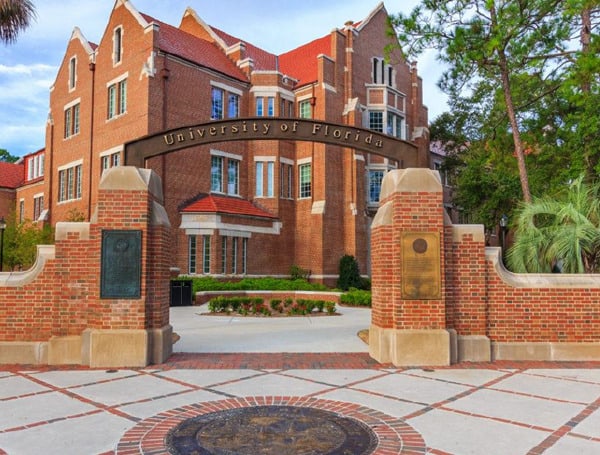Republican U.S. Sen. Ben Sasse on Wednesday was confirmed as the incoming president of the University of Florida, as several members of the state university system’s Board of Governors defended Sasse amid student and faculty opposition.
Members of the board, which oversees the state’s network of 12 universities, unanimously approved a five-year compensation contract for Sasse includes a $1 million base salary.
Sasse would be paid an additional $1 million for serving a full five-year term as president and also is eligible for an annual performance bonus of 15 percent after May 30, 2024.
In addition, Sasse would be eligible for annual salary increases starting in mid-2024 if he meets certain performance goals set by the university.
Board of Governors member Charles Lydecker heaped praise on Sasse, calling him a “game-changer” for the university. Lydecker also served on a committee that directed UF’s search for a new leader to succeed outgoing President Kent Fuchs.
“Dr. Sasse is a workhorse, a life-long learner, a community builder, an intelligence expert, a child of agricultural upbringing, a scholar, a teacher, a public servant, an optimist, and a relatable, humble person at the same time,” Lydecker said.
Sasse holds a bachelor’s degree from Harvard University and a doctorate degree from Yale University. Sasse also previously worked as a professor at the University of Texas at Austin and spent five years as president of Midland University, a small private school in Nebraska.
The Nebraska Republican, who was first elected to the Senate in 2014, on Wednesday repeated a pledge to the board that he will not engage in partisan politics while he leads the state’s flagship university. Sasse also told the board that he intends to compete with other universities in recruiting faculty and other talent to UF.
In the news: Florida Gov. DeSantis Gives Updates On Preparation Efforts Ahead Of Tropical Storm Nicole
“We’re going to have to create a civilization of life-long learners, and we have to welcome a rising federation to that project. So, we want the best teachers, and the best researchers teaching the best students. We want cutting-edge research tackling our toughest challenges, and we want to be stealing talent from across the country,” Sasse said.
But Sasse has faced heavy opposition from students who protested his selection by UF trustees as the sole finalist for the job last month. The university’s faculty senate also passed a resolution expressing no confidence in the search that led to Sasse’ selection.
Board member Tim Cerio pointed to “troubling” aspects of the university’s search and its “aftermath.” The search was performed under a new state law that allows such presidential searches to be conducted in private. Under the law, names of finalists are made public at the tail-end of searches. Sasse’s selection as the lone finalist left the names of 11 other finalists undisclosed, drawing objections from many in the campus community.
“The UF chair of the faculty Senate, after supporting you, now faces a vote of no confidence for, as I can tell, participating thoughtfully in a process,” Cerio said, also noting that the UF student body president faces an impeachment effort for supporting Sasse’s selection.
“I’m not trying to dump on the faculty and students. I don’t like their methods. And I think it’s unfortunate how they’re approaching it but … their opinion is valid. But how do you build bridges, how do you reach out to them?” Cerio asked Sasse.
Sasse expressed a goal to create an environment at the school of about 60,000 students to “live in community together” and to meet with various campus stakeholders. But he also suggested that some of the heartburn about his candidacy was sensationalized.
“There is always going to be, in a time as disrupted as ours, a sort of sensationalist tendency to take whatever an angriest moment is and pretend that it’s a representative moment. Those are not the representative moments,” Sasse said.
Board member Alan Levine was more scathing in his comments about UF students’ reaction to Sasse.
“I’ve kept my tongue on this but I can’t anymore. Because on the one hand, I was glad to see student activism on campus. I think that’s fantastic,” Levine said. “But I also saw people saying that you were unqualified for this job because of your beliefs. And that bothers me.”
Levine pointed out that Fuchs has a master’s degree in divinity from Trinity Evangelical Divinity School. Levine said that Fuchs’ religious education didn’t affect Fuchs’ ability to lead UF during a time in which it rose to become a top-five-ranked public university.
Levine also cautioned Sasse not to “overcorrect” based on criticisms of his personal beliefs.
“Being the president of the University of Florida is a very political position. It requires relationships in Tallahassee, in Washington. And I don’t think you should overcorrect here. Part of what is great about you as a candidate is that you can open doors for the university,” Levine said.
The Board of Governors on Wednesday also confirmed the appointments of Kenneth Jessel to serve as president of Florida International University and Stacy Volnick as interim president of Florida Atlantic University.
Visit Tampafp.com for Politics, Sports, and National Headlines. Support journalism by clicking here to our GiveSendGo or sign up for our free newsletter by clicking here.
Android Users, Click Here To Download The Free Press App And Never Miss A Story. Follow Us On Facebook Here Or Twitter Here.

